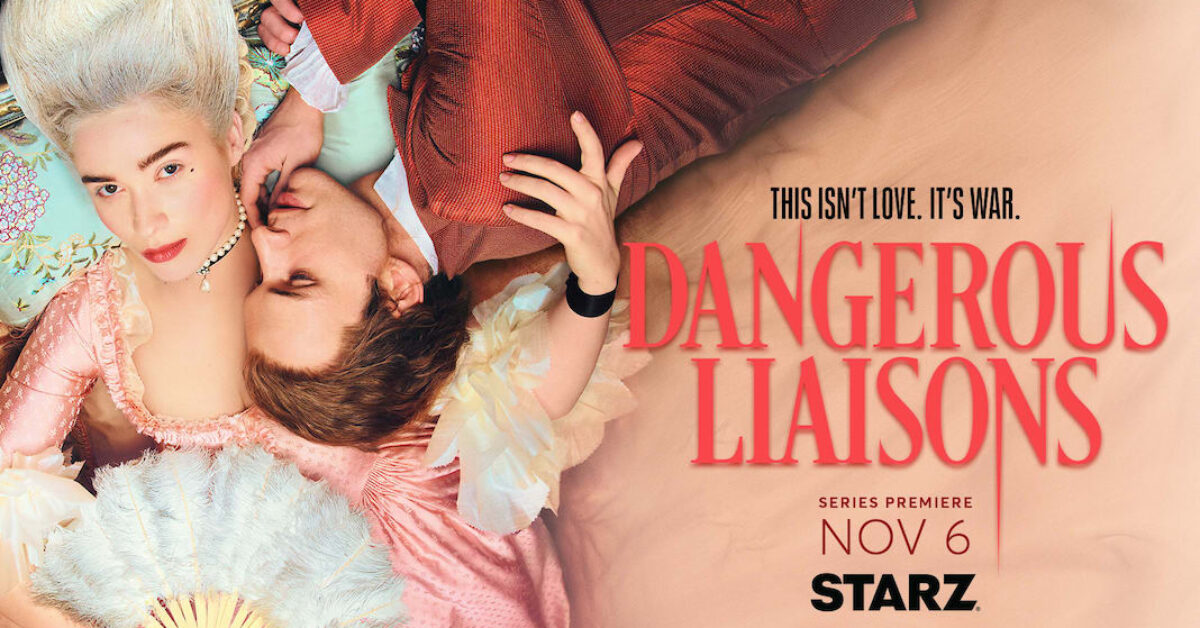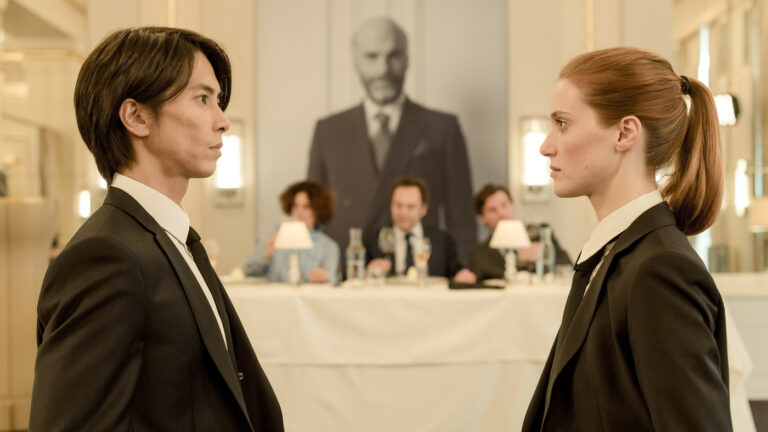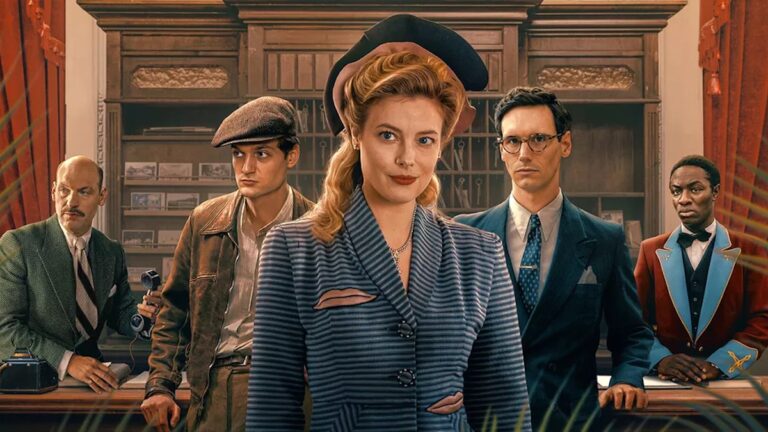The iconic epistolary novel, Les Liaisons Dangereuses, by Pierre Choderlos de Laclos was published in 1782. Yet, two and a half centuries later, we still can’t get enough of his irresistibly wicked characters. The story follows the Marquise de Merteuil and the Vicomte de Valmont, former lovers turned enemies engaged in a deadly rivalry in the pre-Revolution French court. The two aristocrats use seduction and manipulation to weave a Machiavellian web, and anyone who gets caught in it is merely spider chow.
The book has been the subject of several adaptations, including a widely popular 1985 play, a 1988 film adaptation of that same play, the proto-Gossip Girl 1999 film, Cruel Intentions, and, most recently, a Netflix movie, also called Dangerous Liaisons. That film, which came out in July, is a French language modern adaptation set in an elite Biarritz high school, and somehow ends up feeling like the pink sheet at the bottom of a stack of carbon copy paper, the story blurred and mutated through too many reproductions. At its best moments, it’s no more than a bad knockoff of the Gossip Girl reboot in the guise of French literature, with a white rapper Valmont and a Sharpay Evans-styled Merteuil. At its worst, it’s a truly frightening amalgamation of underage revenge porn. The tale doesn’t translate well, and is not worth the two hours of social media-laden mush leading up to an ending where everyone is forgiven and the lovers live happily-ever-after.
Only a few short months later, however, there’s an even newer Dangerous Liaisons adaptation for television, just out this month on Starz. In this prequel to the novel, our beloved anti-heroes are young adults, just embarking on the path towards their future legendary infamy. The idea stems from literary precedent in the form of a letter in the original novel that implies that the Marquise was not born into nobility, according to the showrunner, Harriet Warner. Merteuil, named Camille in the new show, is a sex worker, and Pascal Valmont is the poor cartographer devoted to rescuing her. They are played, fittingly, by newcomers Alice Englert and Nicholas Denton, whose gentleness and innocence might come as a shock to anyone familiar with the original source material.
Camille appears, at least at first, to have the upper hand, with Valmont asking her to marry him and “forsake all others.” When he professes his love, she smiles and says, “You can’t afford me, Pascal.” She also implies that she “taught [Valmont] everything he knew” about the carnal arts.
But it’s soon revealed that Valmont has had some indiscretions of his own, and that he is, as expected, always playing a game. “It’s either love or war. There’s nothing in between,” Camille says after finding out he has another lover, echoing the original novel.
The lover in question? Geneviève de Merteuil. Yes, this is where it gets a bit confusing. Valmont’s older lover, Merteuil, eventually takes Camille under her wing to spite Valmont after learning that he has several wealthy lovers whom he plans to blackmail for a title. Presumably, sometime down the line, Camille will inherit Merteuil’s name and title? The details are a little fuzzy.
Throughout the pilot, entitled “Love and War,” we get glimpses of Pascal’s potential to become the Vicomte we know and love to hate. And Denton’s Valmont is at his most vibrant when he is at his most duplicitous, transforming from a doting lover into a vicious blackmailer. But Englert’s Camille shows no hint of the Marquise she will someday become, lacking the cunning and street smarts one would expect from a seasoned sex worker trying to weasel her way out of Paris’s slums.
The logic, presumably, follows the novel’s original assumption that the French court is a corrupting force, and that monsters are made, not born. We see this in the influence of Merteuil, who insists that Camille close her heart to love, hide her pain, and create a mask behind which she can live her true life. “Your lover is your future enemy,” she quips in an on-the-nose bit of foreshadowing. (In a wonderful bit of referential casting, Merteuil is played by Leslie Manville, who originated the role of Cécile de Volanges in the 1985 play.)
Still, the pace drags without the wit and subterfuge inherent to the original novel and some of the better adaptations. And what is lacking the most, and even more painfully, is any hint of sex appeal. For an episode with a lot of sex, both shown and referenced, the erotic void is so palpable you could watch it with your parents without breaking into a sweat. Even with half the scenes set in a literal brothel!
Perhaps the setting has something to do with it. The gray, medieval streets of Paris, with their half-timbered houses and laundry hung from windows, are sharply contrasted with the decadent glamor of palace life glimpsed through Merteuil’s eyes. (The episode does open with aristocrats at the opera gleefully spreading gossip about the queen having sex with a horse, so the potential for a gloriously hedonistic vibe is there.) It’s possible that once Camille is sucked into the allure and libertinism of the court, she’ll sharpen up, and so will the sexual tension.
There’s been a boom over the last few years of woke period pieces aiming to reclaim a genre that often glorifies a particular kind of classist, whitewashed version of history. The attempts to update period content fall on a spectrum of “subtle” (Bridgerton, which kicked off a trend in colorblind casting for period pieces) to “taking extreme liberties” (the spectacular camp of The Great). They can also be grotesquely out of synch, as in the recent Netflix adaptation of Jane Austen’s Persuasion, where Dakota Johnson does a feeble impersonation of a 19th century Phoebe Waller-Bridge.
But do all period pieces need to be woke-ified? Starz’s Dangerous Liaisons offers a gentle feminist touch without overreaching, but I’m not sure the story requires it. After all, Les Liaisons Dangereuses is a novel whose main plot revolves around coercion, blackmail, and rape. A little progressive subtext isn’t going to change that.
But maybe we feel guilty, in 2022, appreciating a story in which a woman ruins the lives of others for sport, in the same way we quietly pretend we never liked American Beauty or the “Ignition” remix anyway. We have to give her a sympathetic backstory so that later, when she becomes emblematic of our worst impulses, we can blame society, the patriarchy, or anyone else we can think of. We’ve had our fill of the great era of TV anti-heroines: Claire Underwood, Selina Meyer, Cersei Lannister. We’d rather sand down the edges than trust ourselves to appreciate a masterful work of tragic satire.
For the moment, Dangerous Liaisons promises more than it provides, and mostly makes me want to revisit the Glenn Close/John Malkovich version of the story, or the Sarah Michelle Gellar update. I’ll definitely keep watching, if only out of a refusal to be disappointed. The show was renewed for a second season before the pilot even dropped, so here’s hoping it gets a little sassier and a little steamier before the first eight episodes are through.
—
Catherine Rickman is a writer and professional francophile who has lived in Paris, New York, and Berlin. She is currently somewhere in Brooklyn with a fork in one hand and a pen in the other, and you can follow her adventures on Instagram @catrickman.






